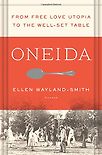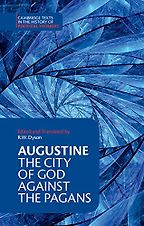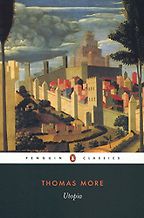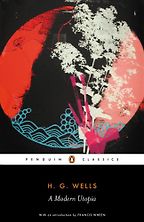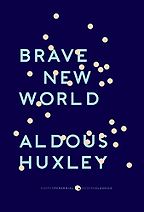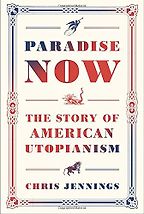Utopia is the topic of our discussion and the topic of your book Oneida: From Free Love Utopia to the Well-Set Table. Tell me what the term means to you.
Utopia generally refers to a positive program for organizing society, but the way they typically envision organizing is either impractical or improbable so utopias usually fail. Utopias help us index and critique contemporary social conditions; they open our eyes to the ways in which current ways of organizing are narrow or biased.
You have an ancestral attachment to this topic. Please explain.
My great great- great-grandparents were the six couples that formed the Oneida community in the 1840s. Originally they lived in Putney, Vermont. When their polyamory was discovered, they were kicked out of Putney and moved to Oneida, New York. That is where they really started their community in earnest in 1848. My ancestors were the original nucleus of the community. The community pretty much stayed together—up until the dissolution in 1880—and then turned into a silverware manufacturing company, which was kind of family-owned. I still have strong connections to Oneida. My parents still live in the chateau that the communitarians built for themselves in the 1860s and 1870s.
The idea of a perfect community dates back, at least, to Plato’s Republic. Your first title, from the fifth century, is a cornerstone of Western thought. Tell us about Augustine’s City of God.
Augustine’s City of God created the distinction between the ‘City of God,’ which is perfect, and the earthly city, where we live day-to-day. Augustine seems to envision the ‘City of God’ as something that would be given material manifestation after the Last Judgment. People who have tried to form utopias have always tried to reconcile the ‘City of God’ with the city of men. Since humans are fallen, by nature, no earthly utopia will ever approach the perfection of the ‘City of God.’
Did the founders of utopias, particularly Oneida, read all the way back to Augustine?
Oneida’s founder, John Humphrey Noyes, had a classical education at Dartmouth. As an undergraduate he trained in law; then he got his divinity license from Yale Theological Seminary. So he would’ve been versed in biblical scholarship, including Augustine.
“Utopian projects usually end disastrously.”
Noyes does not refer to Augustine in his writing, but I’m sure that City of God was part of his basis for the distinction he made between what he called the visible world of saints from the invisible world of saints. For him, the invisible world was a heavenly association of angels that would join with the earth when the Last Judgment came. It seems likely that City of God was part of his background given that Noyes also envisions two distinct cities that will merge one day.
Let’s move on to Sir Thomas More, who coined the term utopia in 1515. Tell us about Utopia, the word and the book.
The word means ‘no place,’ a place that does not exist. So ‘utopia’, from Thomas More’s time onwards, is a place that is predicated on invention.
Thomas More’s Utopia shows you cannot have a utopia without commonality of property. More was building on older ideas about an earlier age, an Edenic state, when private property didn’t exist. He talks about how there are no locks on the doors in Utopia, because if you don’t own anything you do not have to protect against theft. He talks about how there is no private interior in Utopia.
“The word means ‘no place,’ a place that does not exist.”
The Oneida community abolished property, like the utopia More envisioned. But as More surely realized and as soon became apparent in Oneida, you can’t abolish privacy. You can say there is no such thing as private property. But the notion of personal privacy, even intellectual or spiritual privacy, soon creeps back in. More anticipates this when he talks about how there will be little crime in utopia because everything is public business. In my study of utopias, this is often the sticking point. A lot of utopias had a notion of a common good that includes property held in common. The tricky part is how you prevent that from becoming oppressive in a Panopticon-like way, which insists that all private business is public.
Is More’s Utopia understood as a work of satire?
Some say it underscores the ridiculousness of the utopian project. Marxists have read it as a precursor of socialism. There is an ambiguity in tone that people wrestle with.
Your book points out the tension between the founding principles of the Oneida community and what Oneida became in its later years. Can you please explain that aspect of Oneida’s story?
Originally Oneida entailed not only shared property but also shared persons. Noyes wanted to create one ‘glowing sphere of God,’ as he called it. So the idea was not only to share property but also to share people. Possessive feelings about a wife or a child or a friend, like attachment to personal property, were seen as inimical to a state of holy fusion. They tried to excise ‘stickiness,’ which is what they called attachment. But they found personal attachment, sexual attachment particularly, hard to root out of the human soul. They tried to discipline people out of monogamy.
When Oneida dissolved as a religious community and became an economic entity producing silverware, they retained the social egalitarianism from the old days. They tried to practise an enlightened social capitalism, where there was relative equality between the workers and the management.
But they reverted to monogamy, to stickiness. Not only did they revert to monogamy but they also started to market the silverware they sold by appealing to the traditional monogamous instincts of the America public. Their most famous campaign, during World War II, was called “Back Home for Keeps.” It showed a beautiful woman embracing a returning solider. So the Oneida community financed some of the original goals of its community – social and economic egalitarianism – by reversing their efforts to uproot domesticity.
More’s Utopia gave rise to a literary genre. Let’s talk next about one of the genre’s key titles – H.G. Wells’s 1905 novel, A Modern Utopia. Tell us about the book and its relevance.
In Wells’s A Modern Utopia, like in More’s Utopia, it is not clear whether the author is being straight. Reading Wells is particularly interesting because he drew his observations about utopias from Oneida. He visited the community in the early twentieth century and was disappointed by what they had become. He admired that they were trying to establish more just relationships between labor and capital; but he saw that they did not have any ambitions to expand this model outward. So he found, in Oneida, a parochial and narrow vision of how to revolutionize the world.
What is interesting about A Modern Utopia is something the Oneida community had – a distrust of liberal individualism. They shared the idea that the state had to step in to create a society with equal access to education and to the material means of existence; that, otherwise, liberal individualism’s emphasis on competition among people and personal privacy would undermine the common good.
PB Noyes, the son of Oneida’s founder, promoted Oneida as “a modern utopia.” What did he mean by that and would Wells agree?
That quote is from an article that Wells wrote about his visit to Oneida. What PB Noyes tried to do is secularize his father’s idea of egalitarianism. John Humphrey Noyes had the idea that we were all equal members of Christ’s body. PB Noyes’s generation was basically atheist. What energized them then was to take the labor-capital divide, which was so bitter in the first couple of decades of the twentieth century, and to make it better. They wanted to create, between the workingman and management, a brotherhood rather than an antagonism.
On to Brave New World, first published in 1931. It is a book on many reading lists; why is it on your list?
It is a hilarious, and also very prescient, parody of utopias. Huxley goes back to the idea that coming together and forming a community of common interests is a great idea – it’s the basis of civil society. At the same time, when communities of common interests are taken to utopian degrees the self starts to dissolve into the larger community, you lose privacy and interiority; that becomes frightening. In Huxley’s parody, the people are convinced that they are melding together and that they are completely happy, but in the end it is utterly empty.
Reorganizing the role of sex and reproduction in society is one of the big themes of Brave New World and many real life utopian societies. Why is that? And what role did sex play in Oneida?
The Oneida community had a religious reason for restructuring sexual relationships to avoid monogamy and any special relationships – including those between parents and children as well as those between sexual partners. The idea was that if you got stuck in pairs you were never going to achieve the fusion of the whole community that was their goal. If you are enslaved to passion or desire you cannot give yourself up to God.
Another facet of the Oneida program that was interesting and forward thinking was Noyes’s idea that women couldn’t be spiritual beings with a relationship to God, if they were bound by their biology.
This idea was based in his experience. His first wife had five babies in six years, four of whom were stillborn. Noyes saw how serial pregnancy left his wife in emotional, physical and spiritual shambles. He looked at her and saw that many women were, what he called, ‘propagative drudges.’
He thought women could never be liberated if they were enslaved to their biology, always being pregnant, than chained to the domestic sphere, having to raise children and do all the duties that kept them locked indoors. So birth control became an integral part of the Oneida community.
Few women got pregnant unintentionally and children who were born were raised communally, so that the women weren’t chained to their children and the domestic sphere. That was Oneida’s approach and absolutely – raising children communally and liberating adherents from special attachments was an important part of other utopian plans too.
What is the difference between what we call utopias and what we call communes?
For me, utopia is a term that no one uses anymore. It was a term that made sense in the nineteenth century, particularly in America where many utopias were spawned by the sense that the millennium was around the corner and Christ was coming back to earth. Utopias tried to recreate the conditions of heaven on earth. That was certainly the case with Oneida. Communes seem, to me, to have more limited goals. They reorganize aspects of living to achieve greater happiness for individuals.
Speaking of the Second Coming, the last book on your list is Paradise Now, by Chris Jennings.
It’s called Paradise Now: The Story of American Utopianism.He goes through five utopian experiments in nineteenth century America. It’s a beautifully written book and interesting as well because he takes the odd era of 1840s America and shows how it gave rise to five very different experiments in alternative living. He does a sensitive job of exploring their differences and similarities but he also examines how crazy they seem today. Some of the ideas seem mystical and fabulous; certainly Noyes had some spectacularly strange ideas about gaining immortality through sexual intercourse. The fact that so many of these strange communities sprung up seems unbelievable to the twenty-first century reader. Chris Jennings points out that we seem to have lost something, there seems to be a diminishment of expectations, a loss of energy.
In the wake of the American Revolution over a hundred experimental communities were formed in the United States. Do societies become less experimental as they age into their institutions? Is the West losing the audacity necessary for experimentation?
That is an interesting question. The 1840s were an incredibly weird time. It was a crossroads. It was the beginning of the Industrial Revolution. Class identification and geographical identification suddenly became uncertain, that was upsetting. There were also an explosion of religious sects at this time, with the disestablishment of state and church. I think it was a time when people felt very vulnerable. All these changes and uncertainties crystallized attempts to live otherwise.
Jennings writes that a present day “deficit of imagination” accounts for the fact that there are no utopias at present. Do you see a strong foundation for that analysis?
There does seem to be a lack of interest in what is transcendent, which keeps people from finding more meaningful ways of constructing their lives. But what accounts for the absence of utopian schemes at present is probably less a ‘deficit of imagination’ than a cynicism about whether these things can work. As I began by saying, utopian projects usually end disastrously.
Interview by Eve Gerber
October 20, 2016. Updated: November 27, 2023
Five Books aims to keep its book recommendations and interviews up to date. If you are the interviewee and would like to update your choice of books (or even just what you say about them) please email us at [email protected]
Five Books interviews are expensive to produce. If you've enjoyed this interview, please support us by donating a small amount.

